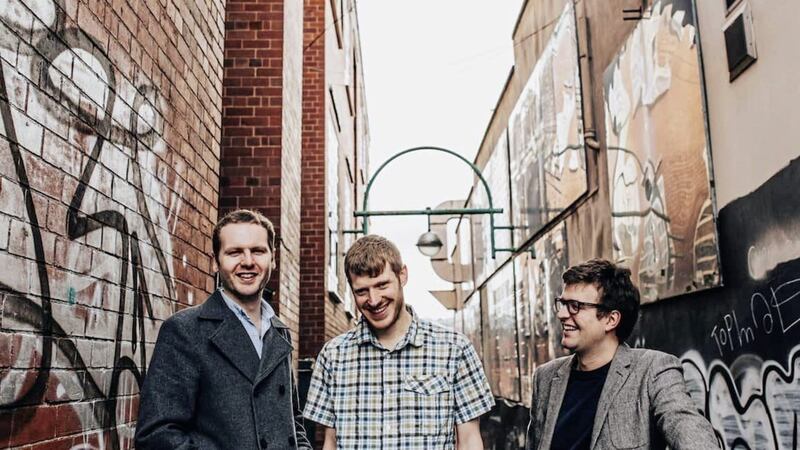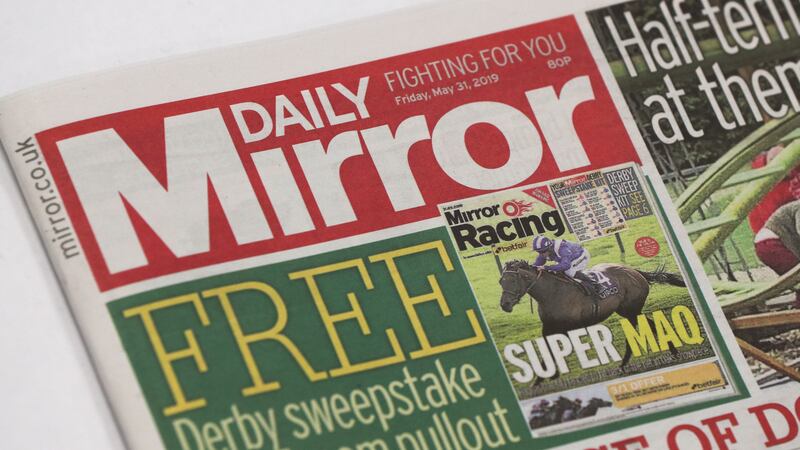GO AND see the Ballad of Johnny Longstaff by English folk trio, The Young’uns, at the Strand Arts Centre in Belfast next Thursday at 8pm. You can thank me afterwards.
“Who are The Young’uns?” I hear you ask. Well, they’re a mainly acapella group who sing traditional and contemporary folk songs and they are brilliant. The Radio 2 Folk Awards agree having named the band Band of the Year twice in the past four years, something which has surprised the band as much as anyone because, as band member Sean Cooney explains...
“We started by accident, really, and that’s partly an explanation of why we have such a horrible name," Cooney laughs.
“When we were teenagers around about 2003/2004, we discovered quite by chance a folk club in which local people were singing traditional songs in the back room of a pub in our home town of Stockton-on-Tees in the north east of England.
“We got to like it and we were amazed that people would sing songs without instruments in their own accents about the places and things that they knew. We were actually alarmed that no-one had actually told us about these songs at school and no-one seemed to really know about these folk songs.
“We were also welcomed so warmly by the people in the club and because we were so much younger than they were, by a couple of decades, they called us the young’uns and the name just stuck.”
The boys – Sean, Michael Hughes and David Eagle – went back to the club every week and immersed themselves in the folk songs of Teeside, not because they saw the opportunity to sing for a living or build a career on it but just because what they heard was “so communal and so worthy and so beautiful”.
Now, Sean is the first to admit that the lads were a bit rough around the edges but people were really encouraging and, realising that they had great passion, gave them all manner of songs and after a while the trio began to get bookings to perform around the country.
Fast forward and The Young’uns have produced five albums to date and as well as being named Best Group at the BBC Radio 2 Folk Awards twice, they have picked up other awards for their brilliant live performances.
The latest album, The Ballad of Johnny Longstaff, I believe has moved the band on to another level. It came about when a man called Duncan Longstaff approached Sean with two bits of paper before a gig The Young’uns were playing in Somerset.
On the first piece of paper was a photograph of Duncan’s father, Johnny, and on the other was a list of things that Johnny had done – before he was 20 years old.
This included organising a strike at a YMCA hostel, taking part in one of the hunger marches, taking part in the famous battle of Cable Street in 1936 and then going off to Spain to fight in the British Batallion of the International Brigades in the Spanish Civil War.
Duncan was hoping that Sean, the band’s songwriter, would write a song about his father. He didn’t. He wrote 16, which now form an album, complete with a hugely evocative scrapbook with the lyrics of the songs and their context pictures of Johnny and other memorabilia.
On The Ballad of Johnny Longstaff, the songs are interspersed with Johnny telling his story in his own words, as recorded for the website of the Imperial War Museum in London.
What I find inspiring is that ordinary young people in working-class areas of Britain and Ireland and elsewhere saw the rise of fascism before anyone else and many volunteered to fight it in the Spanish Civil War of 1936-1939. Sean agrees.
“I think a lot of that story has been forgotten in many parts of Britain for a whole range of reasons, it being overshadowed by the Second World War," Sean explains.
“Johnny and others who survived in Spain were very lucky to be alive but when they came back to Britain. They were victimised and tainted as communists but the reason that Johnny and others went was because they saw that the world war was coming and they went to try and prevent it,."
(There’s an incredible moment in the show when Johnny meets Winston Churchill in Westminster – but you’ll have to see the show to hear about that!)
For the band, Johnny Longstaff’s story is a way of illustrating much of what has been forgotten about life in the inter-war years through songs like Any Bread Mister, the title of Johnny’s unpublished memoir in which he remembers waiting at factory gates waiting on the workers coming out to beg for bread, or Carrying the Coffin, which tells of the hunger marches in Britain in 1922, 1927, 1930, 1932, 1934 and 1936.
Cable Street is another great song about the famous battle in the East End of London on October 4 1936 between Oswald Mosely’s fascists and anti-fascist protesters who blocked their march.
The songs about Spain are in turn stirring, hilarious and scary, and Ta-ra to Tooting is one of the most heartbreaking songs I have ever heard.
In Cable Street, there is a line which goes: “For I’d met refugees who had fled o’er the seas – Germans, Italians and Jews/And I knew their despair for what they’d seen there and I couldn’t let them be abused.”
This, of course, has echoes of what is happening in the world today but Sean is at pains to point out that The Ballad of Johnny Longstaff was definitely not written as a commentary on today’s politics but it is the story of an ordinary man who did extraordinary things for the sake of mankind.
The final track is the well-known Spanish Civil War song, The Valley of Jarama. The Young’uns sing the first two verses and then we hear the voice of Johnny Longstaff himself, singing in his earthy northern accent. Stunning.
When there is so much music available nowadays, it’s exceptional to hear an album that really enhances your life.
The stage version of The Ballad of Johnny Longstaff can be seen at the Strand Arts Centre on Thursday January 31 at 8pm.








